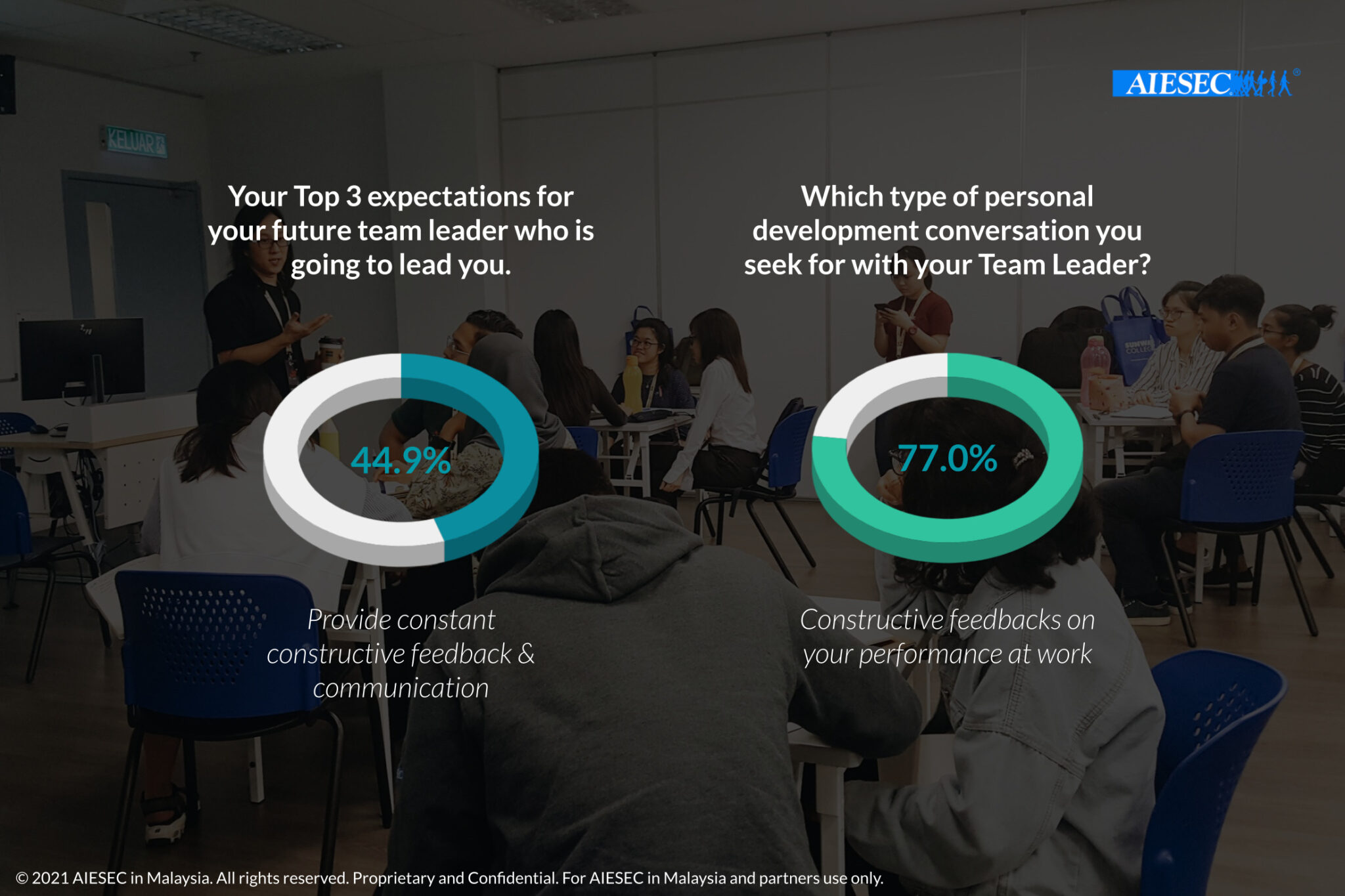
Feedback is information or statements of opinion about something and it is usually used as a basis for improvement. But, what really feedback is in the workplace? And how does it help to boost the performance in the workplace?
I’m a young Malaysian who has just graduated from Curtin University and is stepping into the workplace. I met people from different backgrounds in university and during my internship. Most of the time, people hinder their thoughts and opinions to not hurt someone’s feelings. This happened to me during my internship. I was afraid to speak up my opinion to my leader as my leader was not approachable (top-down approach). I believe that you don’t feel unfamiliar with this scenario in your workplace.
In our recent survey with Malaysian youth aged 19-24, we have found out that 9 out of 10 youths value personal conversation with their direct team leader that focuses on how they can improve themselves to be better. It is also the major factor that makes youths stay in an organisation.

Cultivating a “feedback culture” in the workplace is important to onboard youth in the workforce. In the past weekend, we have had conversations with the AIESEC in Malaysia alumni who are currently working in the Human Resource field and there are the insights we gained!
“Feedback Culture” in Workplace
Jessica, alumni of AIESEC in Malaysia and currently the Learning for Development Manager at L’Oréal, shared with me her thoughts and experiences on the “Feedback Culture” she established at L’Oréal. The managers and leaders are expected to encourage open-feedback in their team. She ensures that both leaders and members understand the value and importance of two-way feedback, regardless of top-down and bottom-up, through expectation setting and upskilling spaces.
Moreover, employee engagement surveys play an important role in feedback. As it is the proof of every statement people made to provide feedback to improve others performance. Jessica said, a statement with proven facts would make feedback easier to deliver and understand.
“Be specific!” she said.
Constructive feedback happens only when it is specific. It sounds simple to be implemented but people often could not provide a clear statement. Here Jessica provided an example, “I understand that you have high expectations on my design skill, but I felt sad and demotivated when you said my artwork was crappy”.
Do you practice giving constructive feedback to your leaders and your members in the workplace?

Conversation with Team Leader
You might ask me, what is “open to feedback”? I think it is the culture the company established to encourage both leaders and members to be open in giving, seeking and receiving feedback. In our Youth Consultancy Report, it shows that working culture is one of the main factors affecting youth stays in an organisation. Open and transparent communication is an important culture of a company.
Evelyn, alumni of AIESEC in Malaysia and currently working as Global HR Transformation Manager at Unilever, said the less-hierarchical structure has encouraged conversations to happen. Even the juniors are never afraid to speak up their thoughts and opinions to their team leader; leaders are comfortable to give and take feedback too. Eventually, the performance at the workplace would be improved with the leadership style.
We all need people who will give us feedback. That’s how we improve. – Bill Gates
The Downside of Feedback?
When I was researching this topic, we saw an interesting article stating : Feedback stops people from learning by themselves and can be unhelpful. What do you think? I was curious what people working in Human Resource would thought about it, so I asked both Evelyn and Jessica.
- “Feedback is not giving steps from A to Z, but to provide guidance to reach Z. There’s a difference between mentoring and spoon-feeding.” said Evelyn.
- “Feedback is an important ingredient in development as everyone has blind spot. You need to be mindful and choiceful to pick up the feedback and it’s not necessary to take everything in.” said Jessica.
I was impressed with both of their answers and it made me reflect on myself when I was leading a team, did I provide guidance or I told my member what they should or should not do; when I was a member, did I pick everything up without thinking it is applicable to my situation or not. But, what do you think as an HR expertise? Do you agree with Evelyn and Jessica mentioned? Do you have any other thoughts on the statement above?
Feedback is like muscle, and performance is like your body. It is torturous when you do weight training for the first time in the gym. However, when you consistently visit the gym for workout, you will slowly get used to training. Then, you will realise that it gives you a better figure in the end. A youth-friendly workplace is also developed through giving constructive feedback for improvements as these are what the youth wants.
Make sure you check out the Summary of Youth Consultancy Report to get the full report from us!

Fion Chua
B2B Marketing Content Creator of AIESEC in Malaysia
A person who loves to put herself in challenging environments. Being empathetic is personality that support her along the journey.

Fion Chua
B2B Marketing Content Creator of AIESEC in Malaysia
A person who loves to put herself in challenging environments. Being empathetic is personality that support her along the journey.




